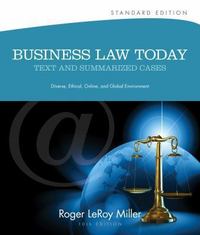A Question of EthicsDissociation. Elliot Willensky and Beverly Moran formed a partnership to buy, renovate, and sell
Question:
A Question of Ethics—Dissociation. Elliot Willensky and Beverly Moran formed a partnership to buy, renovate, and sell a house. Moran agreed to finance the effort, which was to cost no more than $60,000. Willensky agreed to oversee the work, which was to be done in six months. Willensky lived in the house during the renovation. As the project progressed, Willensky incurred excessive and unnecessary expenses, misappropriated funds for his personal use, did not pay bills on time, and did not keep Moran informed of the costs. More than a year later, the renovation was still not completed and Willensky walked off the project. Moran completed the renovation, which ultimately cost $311,222, and sold the house.
Moran then sued to dissolve the partnership and recover damages from Willensky for breach of contract and wrongful dissociation. [Moran v. Willensky, 339 S.W.3d 651 (Tenn.App.
2010)] (See pages 712–713.)
1. Moran alleged that Willensky had wrongfully dissociated from the partnership. When did this dissociation occur?
Why was his dissociation wrongful?
2. Which of Willensky’s actions breached the partnership agreement? Which of his acts were unethical or bad management?
Step by Step Answer:






